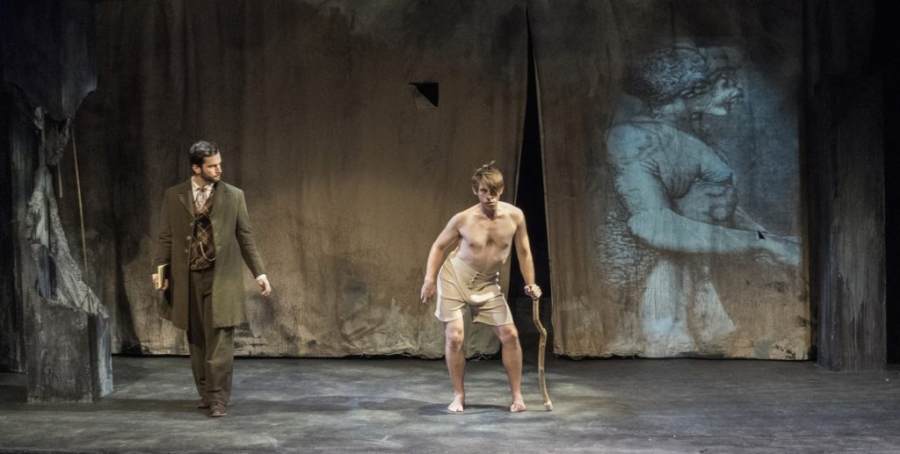

Known as the "Elephant Man," Joseph Merrick (whom the Gallery Players' version of the play The Elephant Man together with the David Lynch film call John Merrick), was a severely deformed man and a Victorian-era curiosity, first as a traveling freak show exhibit billed as ‘Half-a-man and half-an-elephant’ and then as a resident of London Hospital where he was studied, gossiped about in the press and visited by inquisitive high society. The play, written by the recently deceased Bernard Pomerance, premiered at London’s Hampstead Theatre in 1977, before making its transition to Broadway a couple of years later. David Bowie would go on to play the title role, as would Bradley Cooper more recently.
Frederick Treves (Adam Unze) is welcomed by Mr. Gomm (Alfred Gingold), a hospital administrator, as the new physician at London Hospital. Across the street in Whitechapel, Treves encounters Ross (Daniel Damiano), a freak show boss and the epitome of cockney villainy. Ross claims that his star attraction, the Elephant Man, “forces himself to suffer these humiliations...to survive.” John Merrick’s (M. Rowan Meyer) unveiling occurs against a backdrop of photographs of the real Joseph Merrick. Without prosthetics, Meyer as Merrick gradually shifts and contorts his half-naked body until his physical form correlates with these images and Treves’ description of his medical notes.
On tour in Brussels, following a strained, tormented performance of sorts from his ‘Pinhead’ (Jesi Mullins and Brooke Deanna Robinson) freak show cohorts, Merrick is banned and beaten by the police and then robbed of his earnings by Ross. Returning to London’s Liverpool Street Station, his appearance inspires an angry mob and the authorities fetch Treves. At London Hospital, Merrick becomes a study piece for Treves whose "aim for him is to lead as normal a life as possible.” With the help of Gomm’s press article, funds are raised from a curious public that allow Merrick’s hospital residency. This attracts the attention of actress Mrs. Kendal (Elisabeth Preston), who forms a bond with Merrick, an erstwhile novice with respect to keeping female company. Their discussions expose Merrick's true intellect as well as his deliberations on Romeo & Juliet and the love affair therein. As the perception of Merrick advances within fashionable London society, his desire to become a normal human being creates a moral conflict within Treves who is eager to protect him.
Director Mark Gallagher has shaped a gloomy atmosphere, pertinent to the narrative and facilitated by scenic designer Matthew S. Crane’s ruinous columns, Jacob Subotnick’s somber music and an engaging ensemble. The stamina of Meyer’s distressed physicality often emotes more than the conversational pieces; at times the attention to dialogue exposes the potential that is absent from the more contemplative segments. The Elephant Man is nonetheless an eloquently written, thoughtful play; in this instance, well put together, if not a little too restrained. The more compelling scenes include Kendal and Merrick’s evolving friendship and their investigation of one another. As Mrs. Kendal, Preston’s charm and vulnerability instill warmth where there is sadness. Overall, the Gallery Players’ production is commendable for its safeguarding of a heart-rending story.